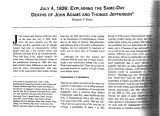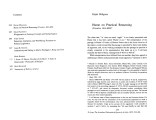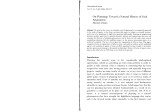|
|
Creator | Title | Description | Subject | Date |
| 151 |
 |
Mallon, Ronald | Political liberalism, cultural membership and the family | In a recent article on developments in John Rawls's theory of justice, S.A. Lloyd notes a problem in Rawls's treatment of the family. In Political Liberalism (hereafter PL), Rawls concedes that his theory assumes that "in some form the family is just." And Lloyd takes this to mean that the principle... | Theory of justice; Equality; Upbringing | 1999 |
| 152 |
 |
Battin, Margaret P. | Death ethics: religious and cultural values in prolonging and ending life | In this sequel to his earlier Birth Ethics, Kenneth Vaux again uses what he calls a 'multiphasic ethical scheme," incorporating naturalistic, humanistic, and theistic values to explore the issues of suicide, euthanasia, letting die, genocide, withdrawing life supports, and other end-of-life issues. | | 1994 |
| 153 |
 |
White, Nicholas P. | Review of Suzanne Mansion, 'Etudes Aristoteliciennes: receuils d'articles | This volume is a posthumous collection of articles, all previously published and almost all on Aristotle, by Suzanne Mansion, along with a list of her scholarly works (xviiixxi). The articles printed here are reproduced photographically along with their original pagination, and a continuous paginati... | Aristotle; Plato; Ancient Philosophy | 1988 |
| 154 |
 |
White, Nicholas P. | Review of Mary Margaret McCabe, "Plato's individuals | This book is an exploration of themes in Plato's metaphysics and epistemology from the Meno through his latest works. McCabe argues that Plato was interested, with increasing explicitness over his lifetime, in questions concerning what it is to be an individual. This interest led him, she maintains,... | Individuality; Identity; Unity | 1997 |
| 155 |
 |
Battin, Margaret P. | July 4, 1826: explaining the same-day deaths of John Adams and Thomas Jefferson | John Adams and Thomas Jefferson died on the same day, July 4, 1826. Both were old men--Adams was 90, and Jefferson was 83--and both were ill, though Adams had been in comparatively robust health until just a few months earlier and Jefferson had been ill for an extended period. They had been rivals,... | Coincidence; Synchrony; Bioethics; Euthanasia; Suicide | 2005 |
| 156 |
 |
Millgram, Elijah | Hume on practical reasoning (Treatise 463-469) | The claim that " 'is' does not entail 'ought'" is so closely associated with Hume that it has been called 'Hume's Law'.1 The interpretation of the passage in Hume's Treatise of Human Nature that is the locus classicus of the claim is controversial. But the passage is preceded by three main bodies ... | Morality; Human Nature; Deductive | 1997 |
| 157 |
 |
Battin, Margaret P. | Textbook of healthcare ethics | Loewy's Textbook of Healthcare Ethics is one of the very few books that is better than its title. It is a textbook; it does address ethics; and it does survey a broad range of issues in health care. Of course it includes the usual theoretical rubrics like autonomy and responsibility, physician/patie... | | 1988 |
| 158 |
 |
Thalos, Mariam G. | Molecule-for-molecule duplication | Is a molecule-for-molecule duplicate D of some entity always a perfect duplicate of it? And in particular: is D a being with consciousness if its original is? These questions summarize a certain diagnostic tool used by metaphysicians, and prominently used in service of a form of dualism that is supp... | Molecule-for-molecule duplication; MFM | 2008 |
| 159 |
 |
Downes, Stephen M. | Herbert Simon's computational models of scientific discovery | Herbert Simon's work on scientific discovery deserves serious attention by philosophers of science for several reasons. First, Simon was an early advocate of rational scientific discovery, contra Popper and logical empiricist philosophers of science (Simon 1966). This proposal spurred on investigati... | Android epistemology; Psychological processes; Cognitive individualism | 1990 |
| 160 |
 |
Battin, Margaret P. | Terminal sedation: pulling the sheet over our eyes | Terminal sedation-also called "palliative sedation," "continuous deep sedation," or "primary deep continuous sedation"-has become a new favorite in end-of-life care, a seeming compromise in the debate over physician-assisted dying. Like all compromises, it offers something to each side of a dispu... | Terminal sedation; Palliative sedation | 2008 |
| 161 |
 |
Mallon, Ronald | Innateness as closed process invariance | Although we are enthusiastic about a Darwinian approach to culture, we argue that the overview presented in the target article does not sufficiently emphasize the crucial explanatory role that psychology plays in the study of culture. We use a number of examples to illustrate the variety of ways by... | | 2006 |
| 162 |
 |
Plutynski, Anya | Explanation in classical population genetics | The recent literature in Philosophy; of biology has drawn attention to the different sorts of explanations proffered in the biological sciences--we have molecular, biomedical, and evolutionary explanations. Do these explanations all have a common structure or relation that they seek to capture? This... | Biology, Philosophy;; Explanation; Genetics; Life sciences; Population genetics; Science | 2005-12 |
| 163 |
 |
Tuttle, Howard N. | Philosophical genesis of ideal types | The conception of ideal types as a method of the synthesis of sociohistorical phenomena was introduced by the German philosopher Wilhelm Dilthey (1883-1911). However, this fact has been largely ignored in the literature. That he was the originator of this notion is, I suppose, of only historical in... | Philosophy;; Social Sciences | 1980 |
| 164 |
 |
Millgram, Elijah | Harman's hardness arguments | In "Change in View" Gilbert Harman produces arguments of the following pattern: Of two competing methods of belief revision, one is too hard; the other must therefore be the rational method. I will call arguments of this form hardness arguments. Hardness arguments are not, of course, peculiar to Har... | Philosophy;; Rationality; Reason; Cognition | 1991-09 |
| 165 |
 |
Kukathas, Chandran | Multiculturalism of Fear (Book Review) | Reviews the book "The Multiculturalism of Fear," by Jacob Levy. | Books; Multiculturalism; Fear | 2003-10-16 |
| 166 |
 |
Millgram, Elijah | Ontological meta-argument (and the ontological argument for the actuality of the world) | Would the Ontological Argument Greater Than Which None Can Be Conceived prove the existence of God? Might an ontological argument prove the actuality of the world (as Robert Nozick once suggested)? Should you believe that you're actual, even if you're not? And what happens if we attempt to answer t... | Meta-argument; Proof of God; Philosophical proofs | 2004 |
| 167 |
 |
Battin, Margaret P. | On the structure of the euthanasia debate: observations provoked by a near-perfect for-and-against book. Review symposium on euthanasia and physician-assisted suicide | Something is amiss with the euthanasia debate, and I want to use a smart new book to try to show what it is. The book is Euthanasia and Physician- Assisted Suicide: For and Against, an eagerly awaited volume by three well-known philosophers, Gerald Dworkin, R. G. Frey, and Sissela Bok. Dworkin a... | Physician assisted suicide; Killing and letting die; medical profession | 2000 |
| 168 |
 |
Kachi, Yukio | Hwa Yol Jung, Question of rationality and the basic grammar of intercultural texts | How can we understand other cultures? How can we talk and write about them without ethnocentric prejudice? These questions are as difficult as they are urgent. To begin with, we may say that to understand other cultures we must be objective. But if objectivity involves epistemological independence f... | Lateral universal; Book review; Jung, Hwa Yol | 1989 |
| 169 |
 |
Thalos, Mariam G. | From paradox to judgment: towards a metaphysics of expression | The Liar sentence is a singularly important piece of philosophical evidence. It is an instrument for investigating the metaphysics of expressing truths and falsehoods. And an instrument too for investigating the varieties of conflict that can give rise to paradox. It shall serve as perhaps the most ... | Language; Sentences; Semantic | 2005 |
| 170 |
 |
Chatterjee, Deen | Moral distance: introduction | This issue of The Monist is devoted to the question of how we should gauge the moral significance of distance. "Moral distance," by analogy with "aesthetic distance," may signify degrees of moral indifference, but that is not the theme we are concerned with here. The problem of distance in mora... | Distance; Boundaries; Morality | 2003 |
| 171 |
 |
Tuttle, Howard N. | Negation of history | History is inevitably involved in our philosophical reflections about human nature and destiny. Yet in the past, Philosophy; has had an uneasy and questionable relationship to history. In this paper I would like to examine seven paradigmatic cases which hopefully will illustrate some crucial aspects... | | 1982 |
| 172 |
 |
Millgram, Elijah | Practical reason and the structure of actions | A wave of recent philosophical work on practical rationality is organized by the following implicit argument: Practical reasoning is figuring out what to do; to do is to act; so the forms of practical inference can be derived from the structure or features of action. Now it is not as though earlier ... | Practical reasoning; Inference; Philosophy | 2005-08-24 |
| 173 |
 |
Thalos, Mariam G. | On planning: toward a natural history of goal attainment | The goal of the essay is to articulate some beginnings for an empirical approach to the study of agency, in the firm conviction that agency is subject to scientific scrutiny, and is not to be abandoned to high-brow aprioristic Philosophy;. Drawing on insights from decision analysis, game theory, gen... | | 2008 |
| 174 |
 |
Battin, Margaret P. | Two cardiac arrests, one medical team | The most painful of all medical care decisions concerns life-preserving measures which, because of limited resources, require certain individuals to be excluded in favor of others. How does one weigh the relative rights of individuals to such care? Whenever possible, decisions to withhold lifesaving... | | 1982 |
| 175 |
 |
White, Nicholas P. | Rational self-sufficiency and Greek ethics. | This is a book review of Martha C. Nussbaum's The Fragility of Goodness: Luck and Ethics in Greek Tragedy and Philosophy; (Cambridge: Cambridge University Press, 1986). | Ethics; Moral Philosophy;; Book reviews | 1988 |

























